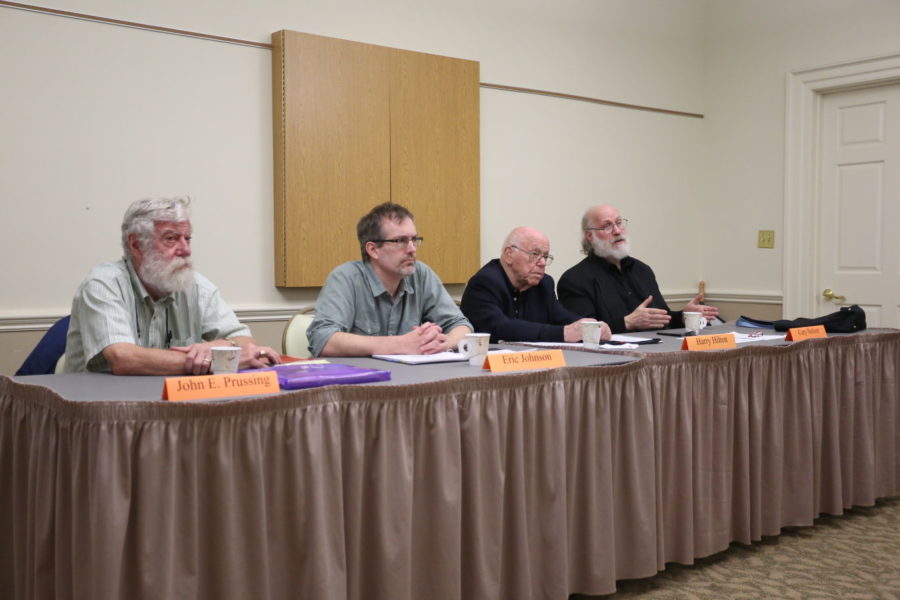AAUP considers modernization in academic freedom
Left to right, John Prussing, Eric Johnson, Harry Hilton, and Cary Nelson speak about academic freedom policies and procedures.
Nov 5, 2014
Last updated on May 11, 2016 at 12:18 a.m.
The American Association of University Professors held a workshop Tuesday, addressing how advances in technology have affected universities’ actions related to academic freedom cases in recent years.
John Prussing, former president of the University AAUP Chapter and emeritus professor in Aerospace Engineering, expressed that new dilemmas in modern technology have caused the need for a refreshed perspective on academic freedom for professors. The AAUP met at the Illini Union to discuss the changes needed.
“Teachers are entitled to freedom in the classroom,” Prussing said. “Obviously, with electronic media, the definition of ‘the classroom’ has changed drastically, and so the issue now is that it’s not a room with four walls and a floor and ceiling, but includes things like websites.”
Cary Nelson, former president of the national AAUP and emeritus professor of Jewish Culture and Society, said the AAUP’s statutes on academic freedom provide specific protection from university discipline for remarks made as a public citizen. He added that modern technology has had an impact on these cases.
Get The Daily Illini in your inbox!
“Extramural speech is defined not by where the statement was made, but by the subject addressed,” Nelson said. “The ‘where’ statement is said through the age of the internet and the 24/7 news, it really becomes meaningless to call something said ‘within the university’ and something said ‘outside’ of it.’”
Nelson emphasized the AAUP has faced difficulty over defending whether academic freedom protects privacy rights for research and teaching conducted by email and to what degree. Nelson said the way academic freedom is regarded today has evolved with new technology, such as email, since the AAUP’s first statement was made on the topic in 1915.
In light of these technological advancements, Nelson said a new definition of academic freedom has been considered.
“We issued a new definition, and recommended that people replace the 1940’s statement, which by the way, is the most commonly used, and one that I think has many problems,” Nelson said.
The new definition states, “Academic freedom is the freedom to teach both in and outside the classroom … Professors should also have the freedom to address the larger community with regard to any matter of social, political, economic or other interest without institutional discipline or restraint…”
Once the floor opened for discussion, Morton Brussel, emeritus professor of physics, asked AAUP panelists to discuss Steven Salaita’s case, which had not yet been mentioned during the meeting.
Salaita’s appointment to the American Indian Studies program was rejected by the Board of Trustees in September, after he posted several controversial tweets on his personal Twitter account.
The University, which was censured by the AAUP in 1963 due to the firing of Leo Koch for defending premarital sex, has been under consideration for censure again due to Salaita’s case. However, no official ruling has been made.
Eric Johnson, past chair of the University Senate committee on Academic Freedom and Tenure, said the committee is currently considering the case.
“I think there’s some great people on that committee. I know that they’re looking at it very carefully; I’m really looking forward to their conclusion,” Johnson said.
Nelson said it would be unusual for the AAUP to take up the case if the University committee has already been specifically assigned to do so. However, he said he is expecting a statement on Salaita’s case from the AAUP before the end of the year.
“I would find it unbelievable if we got to the end of January, and the National AAUP didn’t have a statement on the case,” Nelson said.
Faraz can be reached at [email protected].






